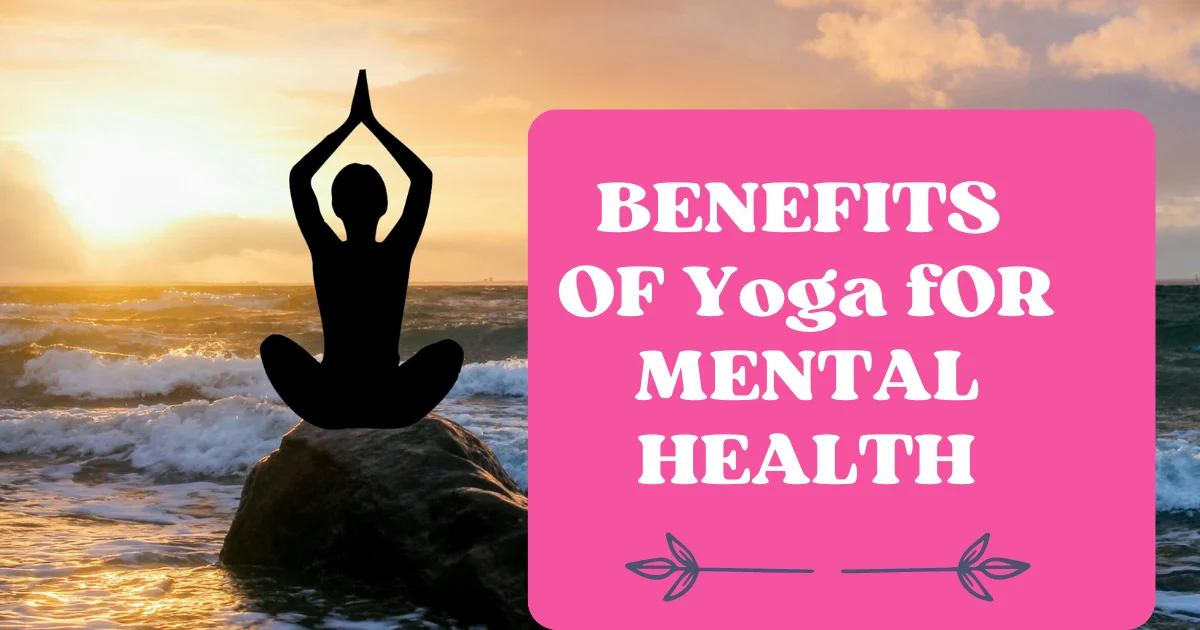6 Unique Benefits Of Yoga For Mental Health
Yoga is a practice that has been used for thousands of years to promote physical, mental, and spiritual well-being. In recent years, there has been an increasing amount of research to support the use of yoga as a complementary therapy for mental health conditions. Mental health issues such as anxiety, depression, and PTSD can have negative impacts on both physical and mental health, and traditional treatments such as medication and talk therapy may not work for everyone. It provides an alternative approach that can help to improve mental health without the use of medication or traditional therapy methods.

Benefits of Yoga for Mental health.
Yoga is a popular practice that has been around for thousands of years. It involves physical postures, breathing techniques, and mindfulness practices that have been shown to promote physical, mental, and spiritual well-being. In recent years, there has been a growing body of research supporting the use of It as a complementary therapy for mental health conditions such as anxiety, depression, and PTSD. Here are some of the ways that yoga can benefit mental health:
• Reducing stress and anxiety
• Improving mood
• Reducing symptoms of depression
• Improving cognitive function
• Improving sleep
• Improving social support and community
In the Article we will explore each of these benefits in more detail and we will explain how yoga can be used as a tool for improving mental health.
READ MORE...10 Best Benefits of Yoga For Physical Health 22 Benefits of Yoga Is Yoga Actually a Good Workout ?9 Unique Reasons What are 10 Benefits of Doing Yoga Everyday?10 Effective Benefits
1.How yoga reduces Stress and Anxiety?
Stress and anxiety are common mental health issues that can have negative impacts on both physical and mental health. Traditional treatments such as medication and talk therapy may not work for everyone. It provides an alternative approach that can help to reduce feelings of stress and anxiety without the use of medication or traditional therapy methods.

1.Promotes Relaxation:
It involves physical postures, breathing techniques, and mindfulness practices that promote relaxation. The practice of yoga encourages individuals to focus on the present moment, which can help to reduce feelings of stress and anxiety. By engaging in deep breathing exercises and focusing on the body, individuals can achieve a sense of calmness and relaxation that can help to reduce feelings of stress and anxiety.
2.Reduces Physical Symptoms of Stress and Anxiety:
The physical postures and breathing techniques used in yoga can help to reduce physical symptoms of stress and anxiety, such as muscle tension and shallow breathing. Yoga poses that involve stretching and deep breathing can help to release tension in the body, which can help to reduce feelings of stress and anxiety.
3.Increases Mindfulness:
It promotes mindfulness and self-awareness, which can help to decrease negative thoughts and feelings. By practicing mindfulness, individuals can become more aware of their thoughts and emotions, and learn to observe them without judgment. This can help to reduce feelings of stress and anxiety and promote a sense of calmness.
4.Reduces Cortisol Levels:
Cortisol is a hormone that is released in response to stress. High levels of cortisol can have negative effects on both physical and mental health. Research has shown that practicing yoga can help to reduce cortisol levels, which can help to reduce feelings of stress and anxiety.
5.Promotes Better Sleep:
Stress and anxiety can often interfere with sleep. It can help to promote better sleep by promoting relaxation and reducing physical symptoms of stress and anxiety. The practice of yoga can help to reduce racing thoughts and promote a sense of calmness, which can help individuals fall asleep and stay asleep.
It provides an effective approach to reducing stress and anxiety. By promoting relaxation, reducing physical symptoms of stress and anxiety, increasing mindfulness, reducing cortisol levels, and promoting better sleep, yoga can help individuals achieve a sense of calmness and well-being.
2.How yoga improves mood ?
It is a holistic practice that has been shown to improve mood and reduce symptoms of depression. The practice of yoga involves physical postures, breathing techniques, and mindfulness practices that promote relaxation and well-being.
1.Increases Levels of Serotonin and Dopamine:
Serotonin and dopamine are neurotransmitters that are associated with feelings of happiness and well-being. The physical postures and breathing techniques used in yoga can increase levels of serotonin and dopamine, leading to an improvement in mood.
2.Promotes Relaxation:
It promotes relaxation and mindfulness, which can help to reduce feelings of stress and anxiety that often contribute to negative moods. By engaging in deep breathing exercises and focusing on the body, individuals can achieve a sense of calmness and relaxation that can help to improve mood.
3.Increases Self-Awareness:
It promotes self-awareness and mindfulness, which can help individuals become more aware of their thoughts and emotions. By practicing mindfulness, individuals can learn to observe their thoughts and emotions without judgment, which can help to reduce negative thoughts and improve overall mood.
4.Promotes Physical Activity:
Physical activity has been shown to improve mood and reduce symptoms of depression. The physical postures used in yoga provide a low-impact form of exercise that can improve physical health and mood.
5.Provides a Sense of Community:
Many yoga classes are offered in group settings, providing individuals with a sense of community and social support. Social support has been shown to improve mood and reduce symptoms of depression.
It is an effective practice for improving mood and reducing symptoms of depression. By increasing levels of serotonin and dopamine, promoting relaxation and self-awareness, providing physical activity, and providing a sense of community, It can help individuals achieve a greater sense of well-being and improved mood.
3.How yoga reduces symptoms of Depression?
Depression is a mental health condition that can cause persistent feelings of sadness and hopelessness. Traditional treatments for depression include medication and therapy, but It provides an alternative approach that can help reduce symptoms of depression without the use of medication.
1.Increases Levels of Serotonin and Dopamine:
Serotonin and dopamine are neurotransmitters that are associated with feelings of happiness and well-being. The physical postures and breathing techniques used in yoga can increase levels of serotonin and dopamine, leading to an improvement in mood and a reduction in symptoms of depression.
2.Reduces Stress and Anxiety:
Stress and anxiety can often contribute to symptoms of depression. It promotes relaxation and mindfulness, which can help to reduce feelings of stress and anxiety that often accompany depression. By engaging in deep breathing exercises and focusing on the body, individuals can achieve a sense of calmness and relaxation that can help to reduce symptoms of depression.
3.Promotes Mindfulness:
It promotes mindfulness and self-awareness, which can help individuals become more aware of their thoughts and emotions. By practicing mindfulness, individuals can learn to observe their thoughts and emotions without judgment, which can help to reduce negative thoughts and improve overall mood. This can be especially helpful for individuals with depression who may struggle with negative self-talk.
4.Increases Physical Activity:
Physical activity has been shown to improve mood and reduce symptoms of depression. The physical postures used in It provide a low-impact form of exercise that can improve physical health and mood.
5.Provides a Sense of Community:
Yoga classes are often offered in group settings, providing individuals with a sense of community and social support. Social support has been shown to improve mood and reduce symptoms of depression.
It provides an effective approach to reducing symptoms of depression. By increasing levels of serotonin and dopamine, reducing stress and anxiety, promoting mindfulness, providing physical activity, and providing a sense of community, It can help individuals achieve a greater sense of well-being and reduce symptoms of depression. It is important to note that while yoga can be a helpful addition to traditional treatment methods for depression, it should not replace medication or therapy without the guidance of a healthcare professional.
4.How yoga improves Cognitive Function?
It is a holistic practice that has been shown to improve cognitive function, which includes mental processes such as memory, attention, and decision-making.

1.Improves Blood Flow to the Brain:
It involves physical postures that can improve blood flow to the brain, which can improve cognitive function. Improved blood flow to the brain can help to enhance memory, attention, and decision-making abilities.
2.Reduces Stress and Anxiety:
Stress and anxiety can negatively impact cognitive function. Yoga promotes relaxation and mindfulness, which can help to reduce feelings of stress and anxiety. By engaging in deep breathing exercises and focusing on the body, individuals can achieve a sense of calmness and relaxation that can help to improve cognitive function.
3.Enhances Neuroplasticity:
Neuroplasticity refers to the brain’s ability to change and adapt in response to new experiences. Yoga has been shown to enhance neuroplasticity, which can improve cognitive function. By engaging in new physical postures and mindfulness practices, individuals can stimulate the brain and promote the growth of new neural connections.
4.Increases Mindfulness:
It promotes mindfulness and self-awareness, which can improve cognitive function. By practicing mindfulness, individuals can learn to focus their attention and improve their ability to concentrate.
5.Enhances Executive Function:
Executive function refers to a set of mental processes that are responsible for planning, decision-making, and problem-solving. It has been shown to enhance executive function, which can improve cognitive function.
It is an effective practice for improving cognitive function. By improving blood flow to the brain, reducing stress and anxiety, enhancing neuroplasticity, increasing mindfulness, and enhancing executive function, It can help individuals achieve greater cognitive function and overall well-being. It is important to note that while yoga can be a helpful addition to improving cognitive function, it should not replace medication or therapy without the guidance of a healthcare professional.
5.How yoga improves sleep?
Yoga is a popular practice that has been shown to improve sleep quality.
1.Reduces Stress and Anxiety:
Stress and anxiety can make it difficult to fall asleep and stay asleep. Yoga promotes relaxation and mindfulness, which can help to reduce feelings of stress and anxiety. By engaging in deep breathing exercises and focusing on the body, individuals can achieve a sense of calmness and relaxation that can help to improve sleep quality.
2.Regulates the Nervous System:
It has been shown to regulate the nervous system, which can improve sleep quality. By engaging in physical postures and breathing exercises, individuals can activate the parasympathetic nervous system, which is responsible for promoting relaxation and rest.
3.Reduces Muscle Tension:
Muscle tension can make it difficult to fall asleep and stay asleep. It involves physical postures that can help to reduce muscle tension and promote relaxation. By engaging in gentle stretching exercises, individuals can release tension in the body and prepare for restful sleep.
4.Promotes Mindfulness:
It promotes mindfulness and self-awareness, which can improve sleep quality. By practicing mindfulness, individuals can learn to focus their attention on the present moment and become more aware of their thoughts and emotions. This can help to reduce racing thoughts and promote relaxation, leading to improved sleep quality.
5.Increases Melatonin Production:
Melatonin is a hormone that is responsible for regulating sleep-wake cycles. Yoga has been shown to increase melatonin production, which can improve sleep quality. By engaging in physical postures and mindfulness practices, individuals can stimulate the production of melatonin and promote restful sleep.
It is an effective practice for improving sleep quality. By reducing stress and anxiety, regulating the nervous system, reducing muscle tension, promoting mindfulness, and increasing melatonin production, It can help individuals achieve greater sleep quality and overall well-being. It is important to note that while It can be a helpful addition to improving sleep quality, it should not replace medication or therapy without the guidance of a healthcare professional.
6.How yoga improves social support and community ?
It is a holistic practice that can improve social support and community.
1.Group Yoga Classes:
Group yoga classes can provide individuals with a sense of community and social support. By practicing It in a group setting, individuals can connect with others who share similar interests and goals. This can provide a sense of belonging and social support, which can improve overall well-being.
2.Mindfulness and Self-Awareness:
It promotes mindfulness and self-awareness, which can improve social support and community. By practicing mindfulness, individuals can become more aware of their thoughts and emotions, which can improve communication and social interactions. This can help to strengthen relationships and build a sense of community.
3.Promotes Compassion and Empathy:
Yoga promotes compassion and empathy, which can improve social support and community. By practicing yoga, individuals can learn to be more compassionate and empathetic towards themselves and others. This can improve communication and strengthen relationships, leading to a greater sense of community.
4.Volunteer Opportunities:
Yoga studios and organizations often provide volunteer opportunities, which can improve social support and community. By volunteering, individuals can connect with others who share similar interests and goals. This can provide a sense of purpose and belonging, leading to improved social support and community.
5.Mind-Body Connection:
It promotes a mind-body connection, which can improve social support and community. By practicing yoga, individuals can become more aware of their physical and emotional needs. This can lead to improved self-care and communication, which can strengthen relationships and build a sense of community.
It is an effective practice for improving social support and community. By practicing yoga in a group setting, promoting mindfulness and self-awareness, promoting compassion and empathy, providing volunteer opportunities, and promoting a mind-body connection, yoga can help individuals achieve a greater sense of community and overall well-being.
Conclusion:
Yoga is a practice that has been used for thousands of years to promote physical, mental, and spiritual well-being. In recent years, there has been increasing research to support the use of yoga as a complementary therapy for mental health conditions. Yoga can benefit mental health by reducing stress and anxiety, improving mood, reducing symptoms of depression, improving cognitive function, improving sleep, and providing social support and community. If you are interested in using yoga to improve your mental health, it is important to consult with a qualified yoga instructor and mental health professional.
Disclaimer: While yoga can have positive effects on mental health, it is essential for individuals with mental health conditions to seek guidance from mental health professionals before beginning any yoga practice. The benefits mentioned are general and may vary based on individual circumstances.
FAQs
How does yoga reduce mental stress?
Yoga reduces mental stress by activating the parasympathetic nervous system, triggering the relaxation response, and releasing tension from the body. It also promotes mindfulness and enhances self-awareness, which can help individuals manage stress more effectively.
How does yoga help us spiritually and mentally?
Yoga can help us spiritually and mentally by promoting mindfulness, self-awareness, and a sense of inner calm. Through regular practice, it can enhance mental clarity, emotional stability, and a deeper connection to oneself and others.
Which yoga is best for mental health?
Several types of yoga can benefit mental health, but Hatha yoga, Vinyasa yoga, and Kundalini yoga are among the best choices as they focus on breathing, meditation, and movement, helping to reduce stress, anxiety and depression. However, the most suitable type of yoga may vary depending on individual needs and preferences.
What is the biggest benefits of yoga?
The biggest benefits of yoga are improved physical and mental health, including increased flexibility, strength, and balance, as well as reduced stress, anxiety, and depression. Yoga is also accessible to people of all ages and fitness levels, making it a highly inclusive and versatile practice.
Can yoga change your life?
Yes, yoga has the potential to change your life by promoting self-awareness, enhancing physical and mental health, and cultivating a deeper connection to oneself and others. Through consistent practice, yoga can help individuals develop resilience, inner peace, and a more positive outlook on life.



